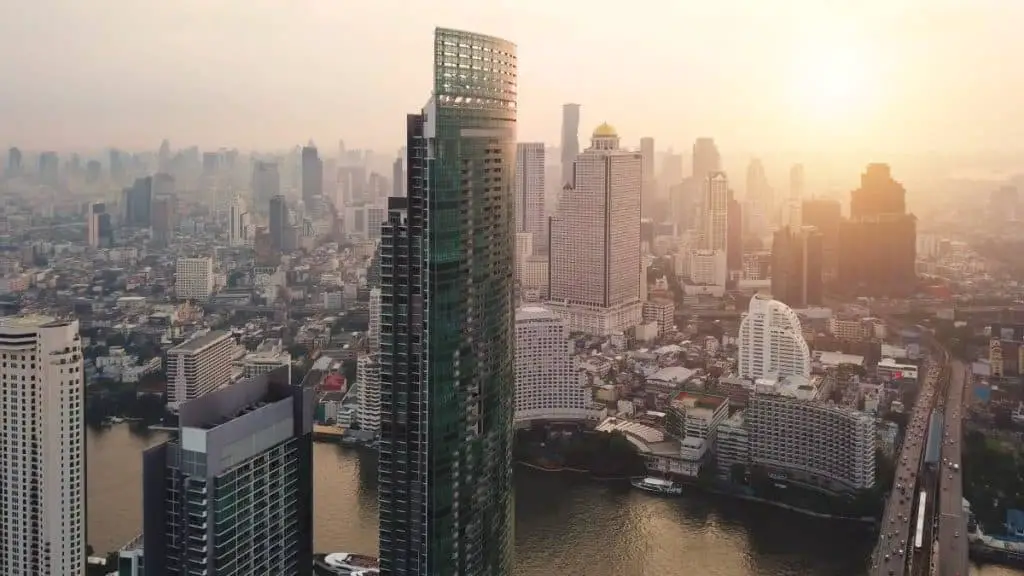The Secret To Property Financing Thailand For Foreigners
After spending 35 years in the United States before making Thailand my home, I’ve learned that navigating property financing here requires a different approach than what most Westerners are used to. Today, I’m excited to share my insights and the latest market developments that could impact your property-buying journey in Thailand.
Key Takeaways
- Foreign buyers can secure property financing in Thailand through select banks with LTV ratios typically ranging from 50-70%
- UOB and MBK Guarantee are currently the most accessible options for foreigners seeking Thai mortgages
- Recent data shows the property market transitioning with new opportunities for foreign investors despite tighter lending criteria
Current State of Thai Property Financing
The Thai mortgage market has been experiencing significant changes. Based on the latest Bank of Thailand data from Q3 2024, total outstanding mortgage loans reached ฿2.72 trillion, showing the market’s substantial size.
However, we’re seeing some interesting trends. In Q1 2024, new mortgage loans for residential properties amounted to ฿61.44 billion, reflecting a more cautious lending environment.
As someone who’s helped numerous expats navigate this market, I’ve observed that while the numbers might seem daunting, there are still excellent opportunities for foreign buyers who understand the system.
Available Financing Options
The financing landscape has evolved significantly over the years. Let me compare your options based on my experience and the latest market data.
Local Thai Banks
Thailand’s banking sector has become increasingly open to foreign borrowers, though options remain selective. UOB (United Overseas Bank) currently leads the pack in foreign-friendly lending, offering some of the most accessible programs I’ve seen. Through their Bangkok branches, they provide loans of up to 70% for qualified buyers. Bangkok Bank also serves the international market, primarily through its Singapore branch, which can be a good option if you have regional business ties. HSBC rounds out the major players, though they typically focus on their existing international customers.
Specialized Lenders
One development I’m particularly excited about is the emergence of specialized lenders like MBK Guarantee. Since 2014, they’ve carved out a niche in foreign properties, offering programs specifically designed for international buyers. Their standout feature is a more flexible approach to qualification requirements, though this comes with slightly higher interest rates. Typically, they offer ratios up to 50% for condominiums, which can be a good option if you don’t meet traditional bank requirements for home loans and mortgages.
International Solutions
I’ve seen many successful buyers leverage international financing solutions. This might involve using equity release from property in your home country or working with global banks that offer cross-border lending. Some of my clients have successfully secured offshore financing arrangements, particularly those from Singapore, Hong Kong, or other major financial centers. The advantage here is often better interest rates, though you’ll need strong financial credentials.
Recent Market Trends
Looking at the latest Bank of Thailand data from Q3 2024, we’re seeing total outstanding mortgage loans of ฿2.73 trillion, indicating a robust market despite tighter lending conditions. For foreign buyers, this translates to more scrutiny in the approval process, but opportunities remain strong if you know where to look.
My experience has shown that the best approach often combines multiple financing options, creating a strategy that aligns with your specific circumstances and goals. The key is understanding which doors are truly open to foreign buyers and how to present yourself as a strong candidate to potential lenders.
Understanding Eligibility Requirements
Understanding eligibility requirements is crucial. These requirements have become more structured recently, particularly as the financial institutions report a shift toward more conservative lending practices. Let me break down the key requirements into two clear tables that reflect current market conditions.
Core Eligibility Criteria
| Requirement Category | Thai Nationals | Foreign Buyers |
|---|---|---|
| Age Range | 20-65 years | 21-65 years |
| Minimum Annual Income | ฿180,000 | SGD 100,000 or equivalent |
| Employment Status | Any verified income | Work permit holder or offshore income |
| Credit History | Thai credit bureau check | International credit verification |
| Residency Status | Thai citizen | Work permit or specific visa types |
| Maximum LTV Ratio | Up to 90% | Up to 70% (varies by lender) |
| Property Types | All types | Primarily condominiums |
Required Documentation
| Document Type | Purpose | Validity Period |
|---|---|---|
| Passport | Identity verification | Valid for 6+ months |
| Work Permit | Employment verification | Current |
| Bank Statements | Income verification | Last 6 months |
| Income Tax Returns | Financial stability | Last 2 years |
| Employment Contract | Income verification | Current |
| Marriage Certificate* | Legal status | If applicable |
| Property Documents | Ownership verification | Current |
| Credit Report | Financial history | Within 3 months |
These reflect the current lending environment, where banks are particularly focused on income stability, smooth repayments, and documentation. From my experience, the key to a successful application isn’t just meeting these criteria but being able to demonstrate strong financial responsibility and stability. I’ve seen that well-prepared applications with complete documentation typically move through the process much more smoothly.
While these requirements might seem stringent, they’re designed to protect both the lender and the borrower. In today’s market, with the Bank of Thailand reporting new mortgage loans of ฿82.61 billion in Q1 2024, maintaining these standards helps ensure market stability.
Loan Terms and Interest Rates
Currently, the average minimum retail rate (MRR) for domestic commercial banks is 8.02% (as of July 2024), up from 7.80% in 2023. Here’s what you need to know about loan terms:
| Loan Type | Typical Interest Rate | Maximum Term | LTV Ratio |
|---|---|---|---|
| Fixed Rate | 6.5-8% | 3-5 years | 50-70% |
| Variable Rate | MRR + 1-2% | Up to 30 years | 50-70% |
| Foreign Specific | 8-12% | Up to 10 years | Up to 50% |
Property Types and Specific Considerations
Based on my experience helping foreign buyers, here’s what you need to know:
Condo:
- Easiest property type to finance
- Must be within foreign ownership quota
- Higher approval rates with major developers
Recent Bank of Thailand data shows interesting trends in property types:
- Low-rise properties: ฿1.86 trillion in outstanding loans
- High-rise properties: ฿624.6 billion in outstanding loans

Cost Analysis and Financial Planning
From my years of experience, I’ve seen that many foreign buyers underestimate the total cost of property acquisition in Thailand. Let’s break down what you really need to prepare for:
Initial Costs:
- Down payment (typically 30-50% for foreigners)
- Transfer duty (2% of registered value)
- Mortgage registration (0.01%)
- Legal fees (₿20,000-30,000)
- Stamp duty (0.05% of loan amount)
Long-term Considerations:
- Currency fluctuation risks
- Annual property taxes
- Insurance costs
- Maintenance fees
Pro Tip: I always advise my clients to maintain a buffer of at least 10% above the calculated costs to account for unexpected expenses and currency movements.
Application Process Simplified
Having guided numerous clients through this process, here’s my streamlined approach to securing your Thai mortgage:
- Initial Assessment
- Gather all required documents
- Verify property eligibility
- Check foreign ownership quota
- Bank Application
- Submit a comprehensive application package
- Provide income verification
- Property valuation process
- Approval Process
- Bank assessment (typically 3-4 weeks)
- Conditional approval
- Final documentation
Looking at recent data, Q3 2024 saw 26,276 new mortgage loan accounts opened, showing steady market activity despite tighter lending conditions.
Risk Management Strategies
Risk management is a critical component of real estate investment, particularly in foreign markets like Thailand. Financial risks represent a significant concern, with key factors including interest rate fluctuations (which have seen a notable increase from 6.73% in July 2022 to 8.02% in July 2024), exchange rate volatility, and potential market value changes that can impact your investment.
To protect your investment, several legal safeguards are essential. These include securing professional legal representation, conducting a thorough title search, obtaining comprehensive property insurance, and considering MRTA (Mortgage Reducing Term Assurance). These protective measures form a crucial safety net for your real estate investment, helping to mitigate potential risks and secure your property interests.
Regional Considerations
Different areas in Thailand offer varying financing opportunities:
The Bangkok Metropolitan Area offers the most favorable financing landscape in Thailand, with borrowers benefiting from higher loan approval rates and a wider selection of lenders. This competitive environment typically results in more attractive interest rates for property buyers in the capital region.
In contrast, resort destinations like Phuket, Pattaya, and Samui present a more challenging financing environment. Lenders generally impose stricter criteria in these areas, including larger down payment requirements. This cautious approach reflects the unique nature of these tourist-driven markets, where property values and rental income can be more volatile.
Common Pitfalls and Solutions
After helping countless ex-pats with their property purchases, here are the most common issues I’ve encountered and how to avoid them:
- Documentation Issues
- Solution: Create a comprehensive checklist early
- Start gathering documents months in advance
- Currency Exposure
- Solution: Consider natural hedging strategies
- Explore multi-currency loan options
- Legal Misunderstandings
- Solution: Engage qualified legal representation
- Understand all contract terms before signing
Market Outlook and Opportunities
As we navigate through 2024, I’m seeing some fascinating shifts in Thailand’s financing landscape. Let me share what the data tells us and, more importantly, what it means for foreign buyers looking to enter the market.
Current Market Status
The Bank of Thailand’s latest figures paint an interesting picture. With total outstanding mortgage loans reaching ฿2.73 trillion in Q3 2024, we’re seeing a mature market that’s adapting to new economic realities. In my recent consultations with clients, I’ve noticed banks becoming more selective but not necessarily more restrictive – it’s about quality over quantity now.
Interest Rate Environment
The lending landscape has shifted significantly. We’ve seen the average minimum retail rate (MRR) climb from 6.73% in July 2022 to 8.02% in July 2024. While this might seem challenging, it’s created what I call a “buyer’s market” in certain segments, particularly in the condominium sector where developers are more willing to negotiate terms.
Foreign Buyer Opportunities
I’m particularly excited about the opportunities I’m seeing for foreign buyers in specific market segments. The government’s recent initiative to offer ฿55 billion in soft loans to support the property sector signals strong potential for market growth. From my experience, this typically translates into more flexible financing options becoming available through both traditional and alternative lenders.
Regional Market Variations
Bangkok’s property market behaves quite differently from resort areas like Phuket or Pattaya. In Q3 2024, we saw 26,276 new mortgage loan accounts opened, with a significant portion concentrated in the Bangkok metropolitan area. This regional variation creates unique opportunities for foreign buyers willing to explore different locations.
Future Projections
Based on current trends and my decades of market experience, I’m cautiously optimistic about the next 12-18 months. While the headline numbers show some moderation in lending growth, I’m seeing strong fundamentals in key market segments that typically attract foreign buyers. The recent Bank of Thailand data showing an 89.64% average LTV ratio indicates continued market liquidity, though foreign buyers should expect more conservative ratios.
Digital Transformation
One of the most exciting developments I’m watching is the digitalization of property financing. Several major banks are introducing streamlined digital application processes, making it easier for foreign buyers to initiate applications and track their progress. This is particularly relevant for the tech-savvy investors I’m increasingly seeing from Singapore, Hong Kong, and other Asian financial hubs.
FAQs
What’s the minimum income required for financing a property in Thailand?
Can I get a mortgage without a Thai work permit?
What’s the maximum LTV ratio available for foreigners?
How long does the mortgage approval process take?
Are there any special programs for retirees?
Conclusion
Navigating life in a new country comes with its unique challenges and opportunities. Whether you’re curious about visa requirements, daily living costs, healthcare options, or anything else about life in Thailand, don’t hesitate to reach out. Our community is here to help answer your questions and share experiences that can make your transition smoother.
Drop us a message – we’re here to help you make informed decisions about your journey in Thailand!






